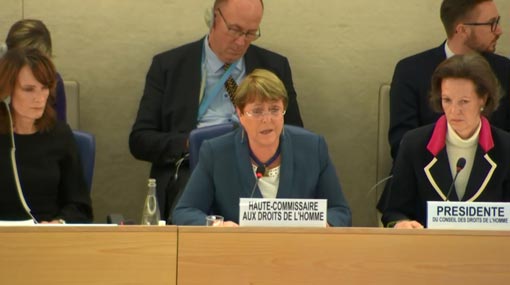UN rights chief responds to Sri Lanka’s withdrawal from resolution
February 27, 2020 06:38 pm
UN High Commissioner for Human Rights Michelle Bachelet says that she regrets the Sri Lankan government’s different approach to the commitments previously made in the resolution with regard to ‘Promoting reconciliation, accountability and human rights in Sri Lanka’.
Delivering an oral update on Sri Lanka at the 43rd session of the United Nations Human Rights Council (UNHRC) in Geneva today (27), she says that this move risks setting back efforts to advance reconciliation, accountability and human rights.
Bachelet further says that she is troubled by the country’s recent trend towards moving civilian functions under the Ministry of Defence or retired military officers.
She also mentions that the increasing levels of hate speech and security and police measures appear to be discriminatingly and disproportionately directed against minorities.
Claiming that Sri Lanka’s domestic processes have consistently failed to deliver accountability in the past, Bachelet said that she is not convinced the appointment of yet another Commission of Inquiry will advance this agenda.
The High Commissioner points out that, this will leave victims with no guarantee that past patterns of human rights violations will not reoccur.
Addressing the Council, she said: “I regret that the new government has announced a very different approach to the commitments previously made in the resolution which risks setting back efforts to advance reconciliation, accountability and human rights. The state must work for all its people and the needs of all communities particularly the minorities must be acknowledged and addressed.
I urge the government to preserve and buildup on the gains which have been made over the last few years. In particular, I encourage the government to ensure the Office on Missing Persons and the Office of Reparations are provided with political and resource support.
The families of missing persons from all communities deserve justice and redress. Sri Lanka’s independence institutions strengthened under the 19th Constitutional Amendment are a key pillar in its democratic structure and the space for civil society and independent media must be protected.
I’m therefore troubled by the recent trend towards moving civilian functions under the Ministry of Defence or retired military officers and renewed reports of surveillance and harassment of human rights defenders, journalists, and victims.
The increasing levels of hate speech and security and police measures appear to be discriminatingly and disproportionately directed against minority both Tamil and Muslims.
The fundamental problem remains that Sri Lanka has still not addressed impunity for past violations nor are they taking the security sector reforms needed to address the drivers and enablers. Systemic barriers that continue to exist within the criminal justice system remain an impediment to real justice.
Domestic processes have consistently failed to deliver accountability in the past and I am not convinced the appointment of yet another Commission of Inquiry will advance this agenda. As a result, victims remain denied justice and Sri Lankans from all communities have no guarantee that past patterns of human rights violation will not reoccur.
I urge the council to remain alert to this situation in terms of prevention and to explore all possible avenues for advancing accountability.”












